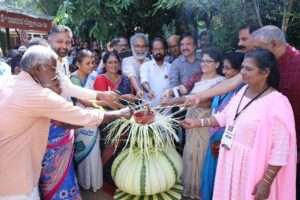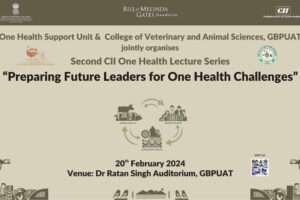 “International Environmental and Economic Forum: Action for the Future and Moving toward a Virtuous Circle for Sustainable Development” was organised by Asian Productivity Organisation (APO) at Ho Chi Minh City, Vietnam during 11-13 May 2017. Dr. K. C. Veeranna participated in the event and shares his experiences and insights here.
“International Environmental and Economic Forum: Action for the Future and Moving toward a Virtuous Circle for Sustainable Development” was organised by Asian Productivity Organisation (APO) at Ho Chi Minh City, Vietnam during 11-13 May 2017. Dr. K. C. Veeranna participated in the event and shares his experiences and insights here.
The Asian Productivity Organisation (APO) is a regional intergovernmental organisation having 20 member countries from the Asia-Pacific who pledge to assist each other in their productivity drives in a spirit of mutual cooperation by sharing knowledge, information and experience [http://www.apo-tokyo.org]. APO has long been endeavouring to contribute to the sustainable development of its member countries through activities aligned with the Green Productivity Program to promote environment-friendly socioeconomic growth. APO organises the Eco-Products International Fair (EPIF) as part of its pursuit of sustainable growth in the Asia-Pacific region, leveraging the channels of international trade, investment, and exchange of knowledge, experiences, and technologies.
The Asian Productivity Organisation (APO) is a regional intergovernmental organisation having 20 member countries from the Asia-Pacific who pledge to assist each other in their productivity drives in a spirit of mutual cooperation by sharing knowledge, information and experience [http://www.apotokyo.org]. APO has long been endeavouring to contribute to the sustainable development of its member countries through activities aligned with the Green Productivity Program to promote environment-friendly socioeconomic growth. APO organises the Eco-Products International Fair (EPIF) as part of its pursuit of sustainable growth in the Asia-Pacific region, leveraging the channels of international trade, investment, and exchange of knowledge, experiences, and technologies. This forum titled, ‘International Environmental and Economic Forum: Action for the Future and Moving toward a Virtuous Circle for Sustainable Development’, was held in parallel with the 11th EPIF [http://epif2017.com] in Ho Chi Minh City, Vietnam, focussing on the concept of a circular economy
that reduces pollution and utilises waste, the role of technology in shaping cleaner industrialisation, and strategies in response to global climate change.
The main objectives of the event were to:
- provide a platform for policymakers, executives, and researchers to exchange knowledge, policies, and practices relating to sustainable development and productivity enhancement
- identify trends, challenges, and strategies for sustainable development, especially in the context of APO economies, such as sustainable industrialisation, industrial transformation, the circular economy, climate change, smart and clean technologies, and the role of international cooperation
- encourage collaboration among the private sector, government agencies, and non-profit organisations in promoting and achieving sustainable socioeconomic growth
- echo the theme of the APO Eco-Products International Fair (EPIF) 2017 and explore possible avenues for sustainable development assisted by the latest technologies and services.
PROGRAMME
The programme had five plenary sessions with different sub-themes. In each session, three to four eminent speakers from various backgrounds presented in accordance with the theme and one panel discussion per session was held. This conference emphasised the latest trends in the circular economy and the role of environment-friendly products and technologies.
Opening session
Speaking at the opening ceremony, Asian Productivity Organisation (APO), Secretary-General Dr. Santhi Kanoktanaporn called upon developing countries, particularly APO members, to focus on sustainable productivity to meet the challenges posed by fast-changing technologies shaping the global economy and driving new business models.
11th Eco-Products International Fair (EPIF) 2017 formally opened on 11 May 2017 at the Saigon Exhibition & Convention Center in Ho Chi Minh City, Vietnam
Welcoming dignitaries and delegates to the EPIF 2017, Vice Minister Trần Việt Thanh of the Vietnamese Ministry of Science and Technology commented that sustainable development was one of the fundamental criteria in reforming the model of economic growth as well as the most significant goal for Vietnam.
Plenary session 1: Circular Economy
Dr. Prasad Modak, Executive President, Environmental Management Centre LLP, Mumbai, India, briefed the participants about the mission, vision and programmes of APO and shared the concept of Green Productivity (GP), which was promoted by the APO. He stressed on issues of sustainability and the United Nations’ 17 Sustainable Development Goals (SDGs), circular economy and its indicators.
Mr. Ken Webster, Head of Innovation, Ellen MacArthur Foundation, UK, informed the audience about the current economy (Linear model of economy) and emphasised some important drivers (price risks, supply risks, natural systems degradation, regulatory trends etc.) for change towards the new system perspective i.e. circular economy. He stressed on the circular economy’s core concepts, principles, implementing strategies and the role of technology in implementing them.
Dr. Heinz Leuenberger, Chief Technical Advisor, United Nations Industrial Development Organisation, highlighted the global trends in economy, energy, and emission. He shared his experience of implementing the initiative, Green Industry, which was put forth with mandates of ‘Greening the Industries and Creating New Green Industries’. He further discussed the various international reports and recommendations related to resource efficiency and circular economy.
Dr. Ryoichi Yamamoto, Emeritus Professor, The University of Tokyo, talked about the impact of climate change on present and future generations. He mentioned eco-design and discussed its importance in maximizing environmental efficiency in the entire life cycle of products. He concluded by mentioning different types of eco-design innovations and their principles.
Plenary session 2: Pollution Control
Dr. Pham Hong Nhat, Head of Environmental Monitoring Division, Institute of Tropical Environment, listed facts related to pollution in Vietnam and the various mitigating strategies adopted by the government of Vietnam. He pointed out various policies and practices to control pollution in Vietnam.
Dr. Prasad Modak talked about the evolution of environmental governance in India, highlighting various acts (the Forest Act, Wildlife Protection Act, Water Act etc.), policies (Forest Policy) and constitutional amendments related to protection of environment and control of pollution. He further underlined various government initiatives on waste management and pollution reduction.
Dr. Heinz Leuenberger shared his experience with the Eco Industrial Park initiative in Vietnam and its role in sustainable development.
Delegates at the International Environmental and Economic Forum:
Action for the Future and Moving toward a Virtuous Circle for Sustainable Development
Plenary Session 3: Waste Management
Mr. Uwe Becker, Project Director, Gesellschaft für Internationale Zusammenarbeit (GIZ), Germany, focused on concepts of fostering resource efficiency with respect to the theme and presented a keynote address on the bilateral resource efficiency project of GIZ India by highlighting various strategies for sustainable management of secondary raw materials.
Prof. Ma Hwong-wen, Professor, Graduate Institute of Environmental Engineering, National Taiwan University, pointed out that the need of hour was to shift the focus from waste management to material management. Introducing the concept of sustainable material management (SMM), he talked about strategies and tools to approach SMM.
Dr. Patrick Schroeder, Research Fellow, Institute of Development Studies, United Kingdom, discussed the insights of approaches towards sustainability on production strategies and consumption patterns in Asian countries.
In my presentation, I highlighted the management of livestock waste and livestock-environment interactions. The contribution of livestock toward greenhouse gases, overgrazing, carrying capacity of land and qualitative degradation of community grazing lands was highlighted. These deliberations led to meaningful discussions and strategies to be worked out to minimise greenhouse gas production.
Plenary Session 4: Trends and Strategies for a Circular Economy
Mr. Uwe Becker shared his successful experience of adopting win-win strategies between assistance providers and recipients in completing a GIZ project.
Dr. Patrick Schroeder presented the concept of circular economy by highlighting various case studies and reports, and elaborated on ways of creating job opportunities in low and middle-income countries via circular economy.
Prof. Ma Hwong-wen talked about the need to shift from waste management policies to circular economy initiatives and presented the key aspects of current endeavours and future prospects on circular economy in Taiwan.
Mr. Ken Webster informed the participants about the various avenues of circular economy specific to the Asia-Pacific countries.
Plenary Session 5: Technologies and Corporate Initiatives
Session 5 had presentations from representatives of the corporate sector who put forth their new technologies and initiatives in streaming the principle of waste recycling, pollution management, and mitigating climate change.
The three-day conference came to an end with a valedictory program during which the participants shared their feedback and suggestions. They exchanged perspectives on how the conference acted as a platform for sharing knowledge among the participants.
11th Eco-Products International Fair (EPIF)
We had the great opportunity to visit EPIF, the largest international environmental fair in Asia, organised at the Saigon Exhibition and Convention Center. The theme ‘Green Technologies and Products: Action for the Future’ focused on future-proofing productivity efforts with a view to achieving sustainable industrial development. EPIF showcased stateof-the-art environmental technologies from across Asia, Europe, and USA, creating awareness about a wide array of environment-friendly products and services. View of 11th Eco-Products International Fair (EPIF), Exhibition and Convention Center.
Implications for extension and advisory services
Extension and advisory services need to focus on recycling of by-products of livestock rearing (e.g. cow dung and urine) by effectively converting them into biogas. To facilitate this, awareness about the different technological options needs to be created among rural women. The conference emphasised the need to involve NGOs and the private sector in combating major challenges encountered during livestock service delivery. The deliberations also discussed the contribution of agriculture and animal husbandry to greenhouse gases and how extension and advisory services could help in its mitigation.
FINAL REMARKS
The conference, through keynote speeches, panel discussions, and expert presentations explored the latest trends, know-how and practices related to waste recycling, pollution management, and mitigating climate change. The participants received valuable information from the different sessions and from knowledgeable plenary session speakers. The conference also provided opportunities for interactions with eminent scientists working worldwide, sharing ideas/experiences with them and establishing new professional relationships.
Dr. K. C. Veeranna is Dean & Professor (Veterinary Extension), Veterinary College, KVAFSU, Shivamogga (India).(Email: veerannakc9@gmail.com)




Add Comment